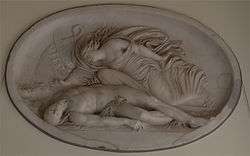Alcyone
.jpg)

In Greek mythology, Alcyone (/ælˈsaɪəˌni/; Greek: Ἁλκυόνη, Halkyónē) was the daughter of Aeolus, either by Enarete or Aegiale. She married Ceyx, son of Eosphorus the Morning Star.
Details of the myth
Alcyone and Ceyx were very happy together in Trachis, and according to Pseudo-Apollodorus's account, often sacrilegiously called each other "Zeus" and "Hera".[1] This angered Zeus, so while Ceyx was at sea (going to consult an oracle according to Ovid's account), the god threw a thunderbolt at his ship. Soon after, Morpheus (god of dreams) disguised as Ceyx appeared to Alcyone as an apparition to tell her of his fate, and she threw herself into the sea in her grief. Out of compassion, the gods changed them both into halcyon birds, named after her.
Ovid[2] and Hyginus[3] both also recount the metamorphosis of the pair in and after Ceyx's loss in a terrible storm, though they both omit Ceyx and Alcyone calling each other Zeus and Hera (and Zeus's resulting anger) as a reason for it. Ovid also adds the detail of her seeing his body washed up onshore before her attempted suicide.
Ovid and Hyginus both also make the metamorphosis the origin of the etymology for "halcyon days", the seven days in winter when storms never occur. They state that these were originally the 14 days each year (seven days on either side of the shortest day of the year[4]) during which Alcyone (as a kingfisher) laid her eggs and made her nest on the beach and during which her father Aeolus, god of the winds, restrained the winds and calmed the waves so she could do so in safety. The phrase has since come to refer to any peaceful time. Its proper meaning, however, is that of a lucky break, or a bright interval set in the midst of adversity; just as the days of calm and mild weather are set in the height of winter for the sake of the kingfishers' egglaying.
The myth is also briefly referred to by Virgil, again without reference to Zeus's anger.[5]
Legacy
- Various kinds of kingfishers are named after the couple, in reference to the metamorphosis myth:
- The genus Ceyx (within the river kingfishers family) is named after him
- The kingfisher family Halcyonidae (tree kingfishers) is named after his wife, as is the genus Halcyon.
- The belted kingfisher's Latin species name (Megaceryle alcyon) also references her name.
- Their story features in The Book of the Duchess.
- Their story is the basis for the opera Alcyone by the French composer Marin Marais
- A collection of Canada's celebrated nature poet, Archibald Lampman, Alcyone, his final set of poetry published posthumously in 1899, highlights both Lampman's apocalyptic and utopian visions of the future.
- TS Eliot draws from this myth in The Dry Salvages: "And the ragged rock in the restless waters,/Waves wash over it, fogs conceal it;/On a halcyon day it is merely a monument,/In navigable weather it is always a seamark/To lay a course by: but in the sombre season/Or the sudden fury, is what it always was."
- Rick Riordan's The Demigod Files had a part called "The Diary of Luke Castellan" which mentions a similar character named Halcyon Green who is the son of Apollo and is currently under "house arrest" for revealing to a woman her fate.
See also
- Alcyone (Pleiades), one of the seven sisters Pleiades and the named after her brightest star (also known as Eta Tauri) in the Pleiades star cluster.
- Halcyon (disambiguation)
Notes
- ↑ Hesiod, Catalogue of Women fr. 15; Apollodorus i. 7. 3 - 4)
- ↑ Ovid Metamorphoses XI, 410ff.-748 (also here)
- ↑ Hyginus Fabulae 65
- ↑ William Smith, ed. (1867). Dictionary of Greek and Roman Biography and Mythology. Volume 1. p. 108.
It was fabled, that during the seven days before, and as many after, the shortest day of the year, while the bird ἀλκυών, was breeding, there always prevailed calms at sea.
- ↑ Virgil Georgics i. 399 - "[At that time] not to the sun's warmth then upon the shore / Do halcyons dear to Thetis ope their wings"
Sources
-
 This article incorporates text from a publication now in the public domain: Smith, William, ed. (1870). "Alcyone". Dictionary of Greek and Roman Biography and Mythology.
This article incorporates text from a publication now in the public domain: Smith, William, ed. (1870). "Alcyone". Dictionary of Greek and Roman Biography and Mythology.
External links
| Wikimedia Commons has media related to Ceyx and Alcyone. |
- Images of Ceyx and Alcyone in the Warburg Institute Iconographic Database